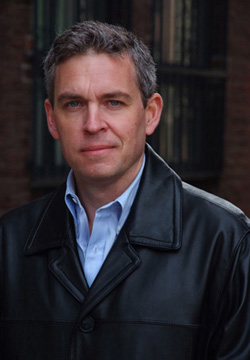WWII from a European perspective
|
At a time when our newly elected president will have to determine when and how to best pull combat troops out of Iraq, a new book by Temple historian William Hitchcock explores how a war of liberation feels from the perspective of those being liberated. In The Bitter Road to Freedom: A New History of the Liberation of Europe (Free Press, 2008), Hitchcock investigates how it felt to be liberated during World War II. He looks closely at the lives of the French people in Normandy, Belgians in the Ardennes region who survived the Battle of the Bulge, the Dutch of northeast Holland whose food supply was cut off for months and the Jewish survivors and the struggle they endured at the war’s end. For many years, Americans have celebrated the courage of the Allied soldiers, sailors, and aircrews who liberated Europe from Nazi tyranny, and are understandably proud of the role the United States played in defeating Hitler’s regime. But, according to Hitchcock, at the same time that we appropriately recognize the heroic feats of the "greatest generation," we often ignore the wartime experiences of the very people for whom the war was fought. |
 Photo courtesy William Hitchcock
Hitchcock
|
|
The idea for the book emerged from Hitchcock’s curiosity about contemporary events. “On the eve of the invasion of Iraq, I knew that Europeans were claiming to oppose the war for a variety of reasons, and it occurred to me that the reasons for their opposition to liberation might be approached historically,” he said. So Hitchcock set out to learn more about how ordinary people in Europe viewed the young soldiers who moved through Europe. “We know a lot about the liberation of Europe, but much of what we know focuses on the great battles in which Americans were involved; we know far less about how the liberated people experienced the final year of war and the first months of peace,” said Hitchcock. For the book, Hitchcock used primary sources, such as letters and diaries. “I could not have written this book without immersing myself in the many collections of personal papers by those who witnessed the final days of the war,” he said. “I found soldiers who did not glorify the war but spoke of the tragedy and senseless loss of life. I also learned of grateful Europeans who nonetheless harbored deep resentment toward their liberators because of the colossal damage and civilian casualties.” Hitchcock's innovative account demonstrates that the liberation of Europe was simultaneously a victory and catastrophe. “It is natural that Americans should be proud of the great sacrifices they made to liberate the European continent, but it is perhaps also natural that Europeans should remember this time as one of mourning and sorrow, given the destruction and loss of life it involved,” he said. Speaking of his work’s present day application, Hitchcock said, “We have learned from World War II that in wars of liberation, civilians are forced to pay a terrible price for their freedom, but that civilians will bear this burden if their liberators deliver swift and complete victory, and offer help once the fighting is done.” “While my book is narrated in a different tone than books by Brokaw or Ambrose — one that conveys a tone of civilian sacrifice — I believe U.S. veterans of WWII will see in my book a war they recognize,” he said. It honors their service by showing how truly great their task was — not only did they have to defeat the Nazis and rebuild a new political order in Europe, they had to do it under the watchful eyes of mournful and bitter civilians.” Hitchcock is a professor of history in the College of Liberal Arts. |
|